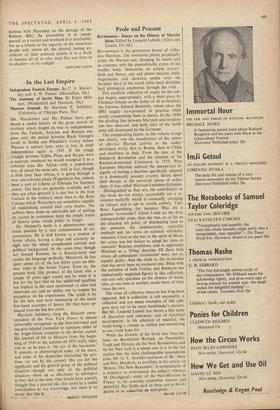In the Last Empire
Independent Eastern Europe. By C. A. Macart- nert. (Weidenfeld and Nicolson, 30s.) Moscow Journal. By Harrison E. Salisbury.
(University of Chicago Press, 56s.)
MR. MACARTNEY and Mr. Palmer have pro- duced a useful history of the great stretch of territory which fought its way to independence from the Turkish, Austrian and Russian em- pires over the period between Black George's revolt in Serbia and Pilsudski's victory before Warsaw a century later, only to lose its brief independence again in 1945. If the rough triangle between Tallin, Plzen and Burgas were a separate continent we would recognise it as a colonial area like Africa—with a population„ too, of about the same size. And in fact, though a little later than Africa, it is going through a new anti-colonial phase (Yugoslavia has, indeed, been a sort of Liberia or Ethiopia for fourteen years). The facts are generally available and if they are often ignored it is due less to the Iron Curtain in the ordinary sense than to the Bone Curtain which Westerners are sometimes capable of maintaining around their own brains. The authors have done an admirable job of putting on record in convenient form the simple truths of history some would prefer to forget.
Dr. Mehnert's book is a phenomenon only made possible by a rare concatenation of cir- cumstances. He is well known as a student of Soviet affairs, having a deep and scholarly in- sight into the whole complicated cultural and political background. At the same time, though not himself Russian, he is Russian-born and speaks the language perfectly. Moreover, he has spent about six of the last thirty years on thir- teen visits to the Soviet Union. Even so, the present book (the product of his latest visit a couple of years ago) would not be what it is but for the fact that he has additional qualities not implicit in the ones mentioned—a clear and observant eye and an ability not to impose his prejudices on his experiences. The result is by far the best and most interesting of the many first-hand accounts of Soviet life that have ap- peared over the last few years.
Harrison Salisbury, long the Moscow corre- spondent of the New York Times, is almost universally recognised as the best-informed and sharpest-minded journalist to represent either of the Anglo-Saxon countries in the Soviet capital. His journal of life in Moscow from the begin- ning of 1949 to the autumn of 1953 really takes you to, as he puts it, 'the eye of the hurricane.' It consists, in chronological order, of his diary, and some of his dispatches (including the por- tions cut out by the censor). His eye for the significant and his general grasp of the political situation—though not only of the political situation--show up as effectively in retrospect as they did at the time. One would have scarcely thought that a journal like this could be a useful contribution to our knowledge, but there is no doubt that this is.
1114
`ROBERT CONQUEST


































 Previous page
Previous page